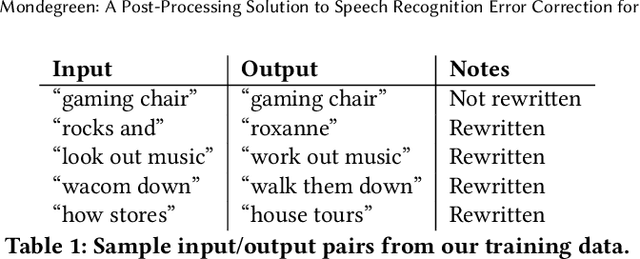Sukhdeep S. Sodhi
BiPhone: Modeling Inter Language Phonetic Influences in Text
Jul 06, 2023Abstract:A large number of people are forced to use the Web in a language they have low literacy in due to technology asymmetries. Written text in the second language (L2) from such users often contains a large number of errors that are influenced by their native language (L1). We propose a method to mine phoneme confusions (sounds in L2 that an L1 speaker is likely to conflate) for pairs of L1 and L2. These confusions are then plugged into a generative model (Bi-Phone) for synthetically producing corrupted L2 text. Through human evaluations, we show that Bi-Phone generates plausible corruptions that differ across L1s and also have widespread coverage on the Web. We also corrupt the popular language understanding benchmark SuperGLUE with our technique (FunGLUE for Phonetically Noised GLUE) and show that SoTA language understating models perform poorly. We also introduce a new phoneme prediction pre-training task which helps byte models to recover performance close to SuperGLUE. Finally, we also release the FunGLUE benchmark to promote further research in phonetically robust language models. To the best of our knowledge, FunGLUE is the first benchmark to introduce L1-L2 interactions in text.
Mondegreen: A Post-Processing Solution to Speech Recognition Error Correction for Voice Search Queries
May 20, 2021



Abstract:As more and more online search queries come from voice, automatic speech recognition becomes a key component to deliver relevant search results. Errors introduced by automatic speech recognition (ASR) lead to irrelevant search results returned to the user, thus causing user dissatisfaction. In this paper, we introduce an approach, Mondegreen, to correct voice queries in text space without depending on audio signals, which may not always be available due to system constraints or privacy or bandwidth (for example, some ASR systems run on-device) considerations. We focus on voice queries transcribed via several proprietary commercial ASR systems. These queries come from users making internet, or online service search queries. We first present an analysis showing how different the language distribution coming from user voice queries is from that in traditional text corpora used to train off-the-shelf ASR systems. We then demonstrate that Mondegreen can achieve significant improvements in increased user interaction by correcting user voice queries in one of the largest search systems in Google. Finally, we see Mondegreen as complementing existing highly-optimized production ASR systems, which may not be frequently retrained and thus lag behind due to vocabulary drifts.
 Add to Chrome
Add to Chrome Add to Firefox
Add to Firefox Add to Edge
Add to Edge